"for" Treasurer
The following images show
the transition of TW Bell's signature "for"
Treasurer from his earliest recorded entry, 16 August 1862 through
18 December 1862. Bell's signing partner was W.B. Walston who signed
"for" Register. So far,
all series of the notes signed by Walston/Bell that we have examined have
mapped to Thian except for runs dated December 11th, 15th and 18th, 1862.
The serial numbers found on these notes, according to the Register of Confederate
Debt, map to AS Watkins, "for" Register
and his signing partner NA Bass, "for"
Treasurer.
Many believe that if signature combinations, date and/or serial number don't map to Thian, the note must be counterfeit. This is simply not the case. It is a good place to start when checking a note; but, it's not always correct as there are a number of errors in the Register. Most of the errors for TRAINS (T39/40) have been found and recorded; but, research on HOERS (T41) hasn't been as widly shared and this type is just now being discussed in greater depth.
Bell's signatures on these December issues are extremely large when compared to his earlier ones. Some recent collectors thought the notes counterfeit because the signatures are so different and with the serial numbers not matching either, that seemed to be a reasonable assumption. That opinion was based on a small sample of notes. However, after quite a few TRAINMEN studied notes in their collections and dealer's stock, it is now a majority opinion that the notes are genuine. And from that opinion comes the one that an error occured in the Confederate States Treasury Department ledger when signers and serial numbers were posted for these series.
While most believe the signatures are actually those of TW Bell, there are some contrary theories. A few suggest the signatures could be secretarial (someone else signed when he was absent) and there are others that believe these notes were stolen from the printer and the signatures forged.
Many TRAINMEN are still studying the notes bearing Bell's signature and at this time, we only agree on one point. We believe the notes themselves to be genuine There is no doubt in our minds that they were printed by Keatinge and Ball in Columbia, S.C. Are the signatures forged, or could they be secretarial, or did Bell change, significatly, the way he wrote his own name over the course of several months? Look at the signatures and points I make about each and see what conclusion you come to? Later, I will insert the opinions of various other TRAINMEN.
Crutch Williams TM-1
The Large Size WT Bell signature is found only on HOERS (T41). The Dates are correct for these six Serial Numbers. No Six (6) Digit serial numbers are recorded for Walston/Bell. All serial numbers listed below are attributed to Watkins/Bass. No specimens signed by Watkins/Bass are known for these 100 number runs that I show examples of. They are as follows:
Known Notes signed Walston/Bell Serial #s this date Serial #'s Known Bell
December 11, 1862 Serial # 103178 < 99801-103200 (103101-103200)
December 15, 1862 Serial # 103202 < 103201-103800 (103201-103300)
December 15, 1862 Serial # 103290 < do do
December 15, 1862 Serial # 108115 < 105401-116800 (108101-108200)
December 15, 1862 Serial # 108698 < do (108601-108700)
December 15, 1862 Serial # 109039 < do (109001-109100)
December 15, 1862 Serial # 113929 < do (113901-114000)
December 15, 1862 Serial # 114021 < do (114001-114100)
December 18, 1862 Serial # 117441 < 116801-117700 (117401-117500)
December 18, 1862 Serial # 121512 < do (121501-121600)
December 22, 1862 Serial # 127919 < 127701-134600 (127901-128000)
December 22, 1862 Serial # 127989 < do do
#note: There are actually several in some runs known
Listed Serial Numbers are notes belonging to Trainmen
Eight hundred (800) sheets of TRAINS a day is equivalent to 6,400 notes signed. Eighteen hundred (1800) sheets of HOERS a day is equivalent to 7,200 notes signed. An increase of only 800 notes per day for a pair of competent signers (200 sheets) is within reason. While some signed 800 sheets, others were signing 900. I also think it would be easier to stack, sign, turn and re-stack 4 subject sheets than the larger and more cumbersome 8 subject sheets. And finally, Memminger had instructed the note signers to stay on the job until the daily quota was met, so this increase would not have added a great deal of time to their day.
The totals listed for Watkins & Bass represent IMPOSSIBLE NUMBERS of runs (sheets) for one pair to sign per day. It is my opinion that there was an accounting error and the clerk making ledger entries for this time period became confused by the same initials of Walston/Bell and Watkins/Bass.
Here are the breakdowns of each pair according to the Register:
Walston/Bell** Serial #'s Registered Total ranges for entire day all signers
August 26th - #1 - 800 = 800 sheets (1-1800)
August 30th - #1801 - 2200 = 400 sheets (1801-2200 / 3801-7200)
September 6th - #10001 - 10800 = 800 sheets (8401-11600)
September 8th & 12th - #11601 - 12700 = 1100 sheets (11601-11900 8th = 300 / 11901-12700 12th = 800)
September 25th - #19001 - 19800 = 800 sheets (16401-19800 / 51601-51700)
September 29th - #22301 - 23100 = 800 sheets (14501-14700, 21501-21800, 21901-2300, 23101-23700, 23801-2400 )
* No further listings for Walston/Bell. What did they do for the two and half months of Oct to Dec 11th?
** Eight (8) Subject Sheets
Watkins/Bass** (Red marked items contain Walston/Bell signatures)
Serial #'s Registered
#103001 - 103800 > December 11th #103001-103200 < 200 sheets
do do > December 15th #103201-103800 < 600 sheets
#107801 - 109500 > December 15th < 1700 sheets (900 + 800 sheets)
#113501 - 114400 > December 15th < 900 sheets
#116801 - 117700 > December 18th < 900 sheets
#121101 - 122000 > December 18th < 900 sheets
#126001 - 126900 > December 18th #126001-126600 < 600 sheets
do do > December 22nd #126601-126900 < 300 sheets
#127701 - 128500 > December 22nd < 800 sheets
#130901 - 131800 > December 22nd < 900 sheets
#134201 - 135000 > December 22nd #134201-134600 < 400 sheets
do do > December 26th #134601-135000 < 400 sheets
** Four (4) Subject Sheets
The number of sheets attributed to Watkins/Bass for December 15th is 3200. The number of sheets for December 18th is 2400. The "norm" for each run of HOERS is 800 sheets with 900 sheets showing up in many cases. Two runs of 800 or 900 and of course smaller runs of 200, 300, 400 &c and combinations are found throughout the Register. With Watkins/Bass showing runs of 3200 and 2400 for December 15th and 22nd respectively, there has to be an ERROR in registering who signed these notes.
We know from the images that follow that Walston/Bell signed #103178 dated Dec 11th, 1862. More than likely, they signed the 200 sheet run of #103001-103200 attributed to Watkins/Bass. I have images of #103202 and 103290 that would suggest they signed the December 15th run of #'s 103201-103800. I also show images of #108698 and 109039 signed by Walston/Bell. These numbers are in the high range of the #107801 - 109500 dated December 15th, a total of 1700 sheets, attributed to Watkins/Bass. Since Watkins/Bass have signed several 900 sheet runs, it stands to reason that #107801-108700 were signed by Watkins/Bass and #108701-109500 were signed by Walston/Bell. Finally, I show an image of #117441 dated Dec 18th, 1862. This suggests that Walston/Bell signed the run of #'s 116801-117700, a total of 900 sheets.
Assigning the above serial number ranges to the two pairs (further examples need to be seen for proof) you get numbers (serial number ranges) that appear a bit more realistic when compared to other known combinations; but, the totals for Watkins/Bass still seem to be too large. If we continue to look at serial numbers and dates for Dec 18th and 22nd, I believe we will find more ranges for Walston/Bell and maybe even some other pair of signers.
Estimates of How Many these two pairs may have signed based on notes seen with their signature:
Walston/Bell Watkins/Bass
Dec 11 = 200 Dec 11 = 0
Dec 15 = 1400 Dec 15 = 1800
Dec 18 = 1800(-) Dec 18 = 600(+)
Dec 22 = 800 Dec 22 = 1600 < This number might to be wrong!
Dec 26 = 0 Dec 26 = 400
Total: 4200 Total: 4400 < These numbers possible
Less(-) 200 Less(-) 400
Total: 4000** Total: 4000**
**MEMO:
If you Delete the 200 sheets I've attributed to Walston/Bell on the 11th and the 400 attributed to Watkins/Bass on the 26th., you end up with exactly the same number, 4000 sheets, signed by the two pair of men.
Check for Dec 22, 1862 notes signed by Walston/Bell!
Randall Smith provided a Dec 22nd example with Walston/Bell signature combination thus adding another range of serial number previously unlisted. This newest addition is #127989.
I have images of FOUR (4) August 16, 1862 TW Bell signatures.
 A
A
 B
B
 C
C
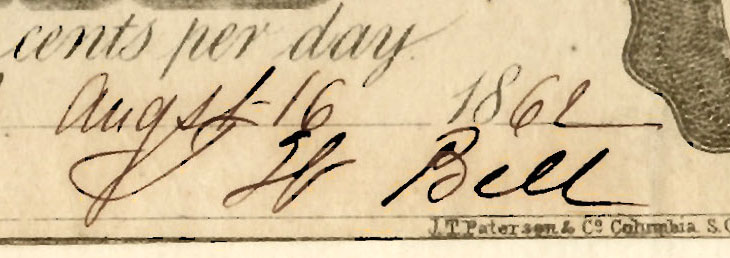 D
D
All the signatures are slightly different, yet there are many similar aspects found on each. I probably should have recorded the serial numbers since A&D look nearly the same and B&C are very similar. In (A) the T, which looks like a "J" has been redrawn. There is a small "x" to start the W which is formed the way I've seen a lot of "H's" made. After the 'Start Point' the 'W' is one contineous stroke. The "B" is made with three separate strokes while the 'ell' is one contineous effort. The (B) signature has a clean "T" made with two strokes. Once again you see a tiny "x" starting point for the 'W' which is one stroke and looks like a 'W'. The "B" is two strokes and well formed with strong 'ell'. In (C) the 'T' is two strokes but is larger and more rounded. There is a heavy ink spot where he set his pen down to start the 'W' which is an even better 'W' than seen in (B). This 'Bell' is almost identical to the previous with the "e" being better formed. The 4th signature probably came after the 1st. The base of the T is much like the 1st with the small loop at top more ike the one on C (3rd). The W is formed almost identical to the one in A example. The 'B' in Bell is the size of A but formed in the same manner as B & C.
One each examples of August 20th, 23rd & 24th Aug 1862
 E
E
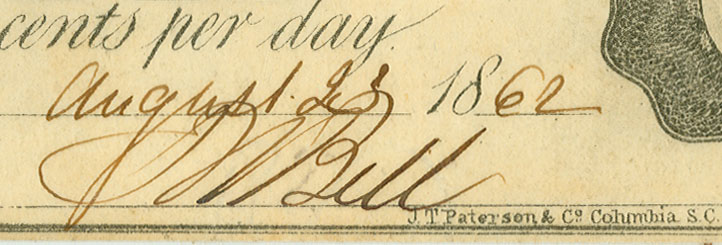 F
F
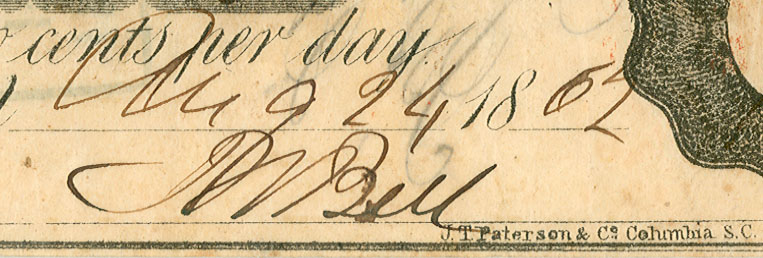 G
G
Example E has a T quite similar to his first one; but, hit actually has three strokes. The W sorta looks like B&C above, but looks drawn and shakey. The B in this case starts with an upstroke and the second part looks like top of 8 and 2 (old style Q) at bottom and that part is one continous stroke. Example F has a T whose first stroke is similar to the first stroke of 'B' in example E. The small stroke at top is tied to the W which is a swirling W of one continous stroke (simlar to the December examples in my opinion). The 'B' starts at top attaching to the last stroke of the W, a loop with old style Q (2) at bottom and is conteneous. Example G on the 24th has a T tight like example B above, a looping W that looks more like an M and a wobbly loop top of B to 2 (Q) and continous to end for Bell.
Here's his first HOER dated Aug 26th, 1862
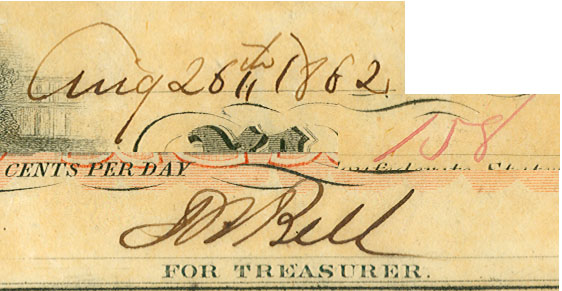 H
H
The 'T' is formed much like exampe G above and the 'B' continues to change slightly but very much like above. Note that this signature is smaller; but, there is probably a reason for this. The SPACE he had to put his name is also smaller.
This August 30th, 1862 HOER is simlar with slight differences from last.
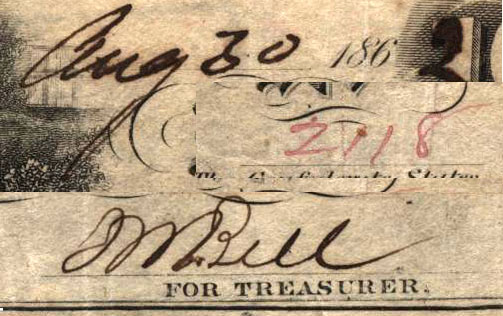 I
I
Here, for the 1st time, we have the letters 'TM' as one continous stroke with the pen stopping and what looks like a period. The 'B' starts very similar to H (and others) with one continous motion to finish.
There are two examples of Sept 1, 1862.
 J
J
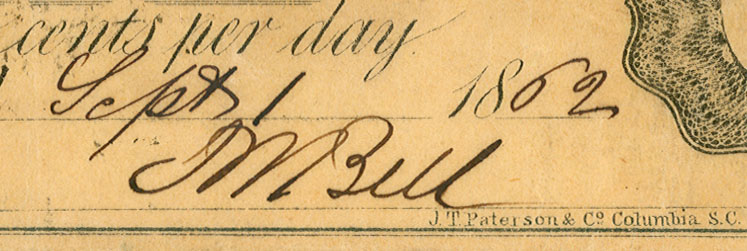 K
K
In example J, the T is one stroke with a small x or cross stroke and then the 'J' which is like some of his early 'T' bottoms. The 'T' in K is somewhere between G & H eamples. The W in J looks more like a 'W' in the beginning but the extra downstoke that is the backbone of the B makes it look like an M. I would call the K example an 'M' if I didn't know it was a 'W'. The top of the 'B' in the J example is smaller than all the other 'B' tops except that of the D example; but, even then it's different. All in all, the K example flows, as a signature better than any previous in my opinon.
I have one Sept 6th example on HOER.
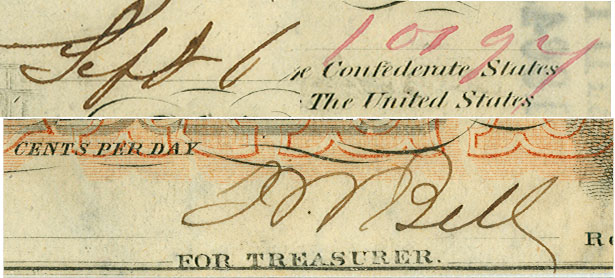 L
L
This L example is a new type of T for Mr. Bell. The W is also more looping with the 'B' in Bell more of a loop/Q (2) but similar to last and others. Notice he adds a downstroke to the last 'L' instead of taking it to the right or upward as all the last have been. (I didn't make note of this previously that he either goes up or straight out with the final stroke.
There are two examples of Sept 8th, 1862
 M
M
 N
N
The 'T' in these Sept 8th examples are slightly different. The 'M' are nearly the same while there is large loop in the top of 'B' in M but it's tight in N.
There are two Sept 11th, 1862 signatures.
 O
O
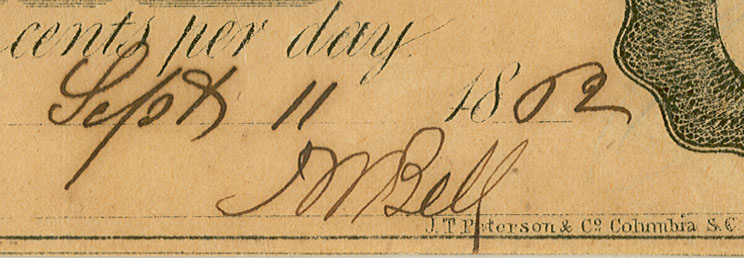 P
P
The O example signature is made with only two (2) strokes. The 'T & W' are one and the 'Bell' is another with the first example of a squiggle 'T'. The 'Bell' is quite similar to last. In the P example, there are three strokes with the top of the 'T' being formed by the first stroke of the 'W'. Here it looks more like an M to me again. The 'B' has a defined loop at bottom as seen in F with loops in each letter of 'ell'. There is only one other signature with formed loops in the last three letters and that is the M example and they are quite weak in that one. His last stroke on this one is straight down.
Sept 15th 1862
 Q
Q
The 'T' in this one is nearly the same as K example and similar to others. The 'W' has flowing loops similar to the I exmaple. The 'B' is larger and flowing and most similar to the B, C & D examples except it's in one stroke. Notice that the 'ell' are tight, no loops, and the last stoke is down and the the first one that goes to the left. He must have set his pen down as that is an ink spot that looks like dotted 'i'. This one looks like JM Bill to me! <G>
Sept 18th, 1862
 R
R
The 'T' is once again similar to several previous signatures. The 'W' looks like an 'M' and is similar to quite a few others. The 'B' is a bit wobbly and bigger with loops in all three letters 'ell' and here the last sroke goes to left like Q.
Sept 25th, 1862
 S
S
This 'T' is like no other example. The 'W' is similar to several but has a tiny upstroke at end. The 'B' is similar to others and the 'ell' have loops; but, the tops of the two L's are very pointed where most of the other ones are rounded. The last stroke is down and to right once again.
December 11th we see the first Large Size signature with serial number that doesn't map to Thian.
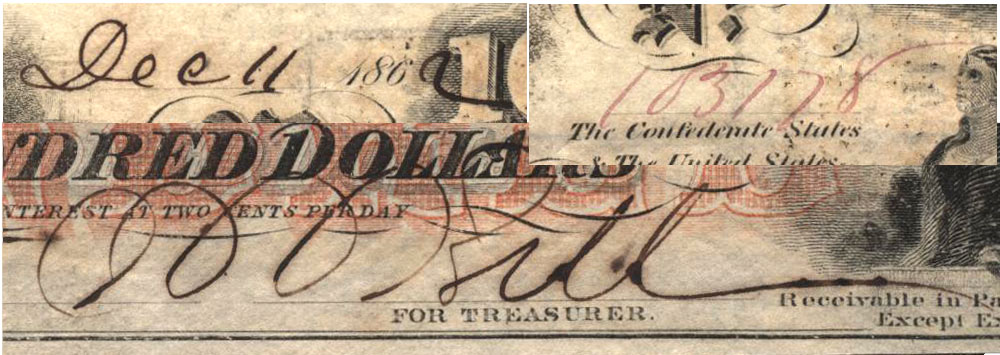 T
T
A three part signature. While there is no exact match for this example, in my opinion there are many similarities to all the letters we've seen previously . The first swirl of the W creating the cross and the 'W' is a well ballanced double loop in the same style as the first. Both letters are most similar to image L. The 'B' here is large and there is a strange squiggle at the bottom that has similar characteristics to the 'T' in the I example. An unformed "e" with normal 'll' we see the last stroke to right which was last seen on A - K examples.
Here are four (4) examples of the December 15, 1862 signatures.
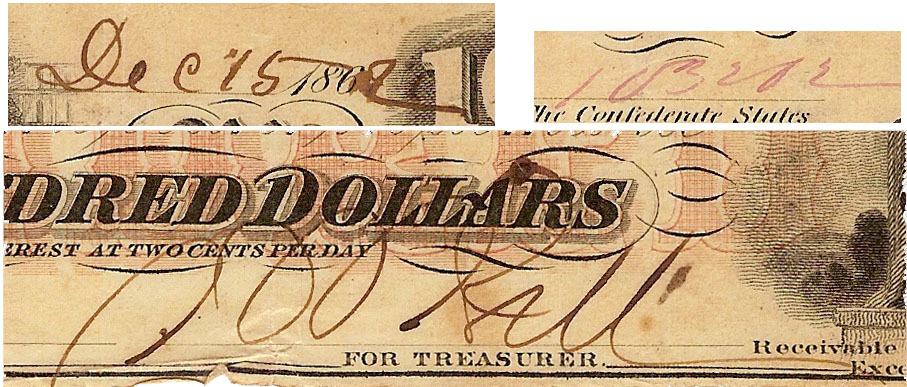 U
U
Three strokes make this signature with end of 'W' extra ink or period.
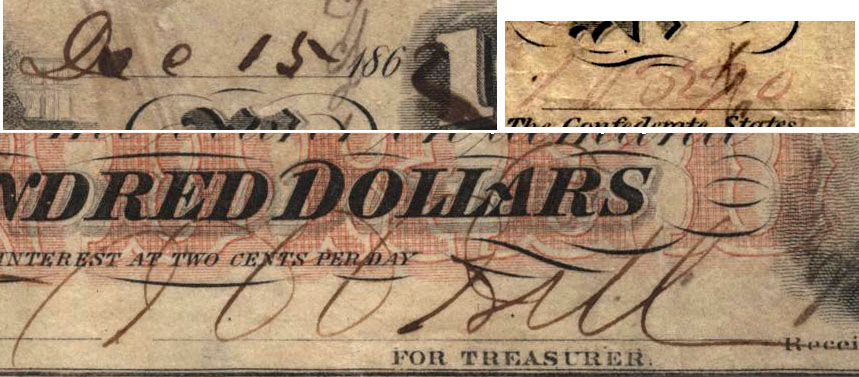 V
V
Four strokes to make this signature with last of 'W' extra ink or period.
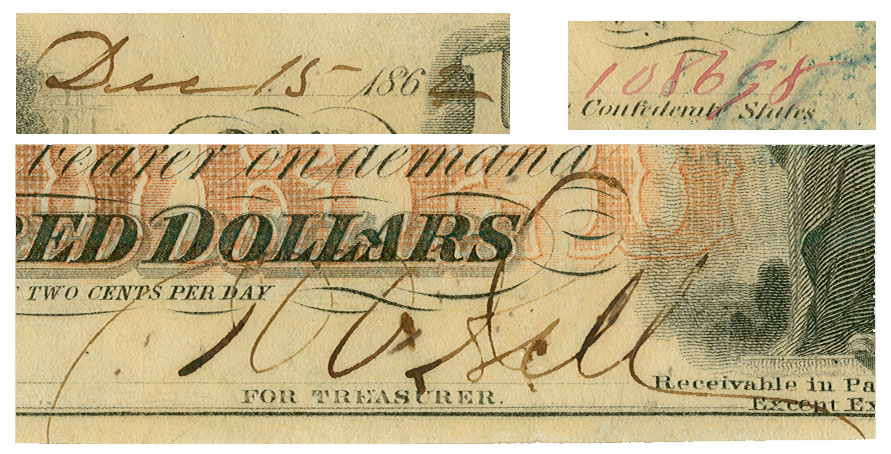 W
W
Three strokes here. There is an end stroke to the W or heavy downward period.
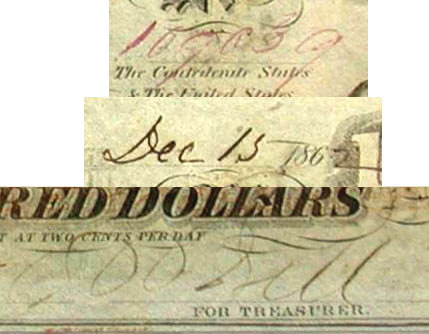 X
X
There is an upsroke at end of 'W' as seen in I, K, L & S. There appears to be 4 strokes used here.
All four of the Dec 15th signatures are basicly the same taking either 3 or 4 strokes to write the name.
This next to last example is dated Dec 18th, 1862.
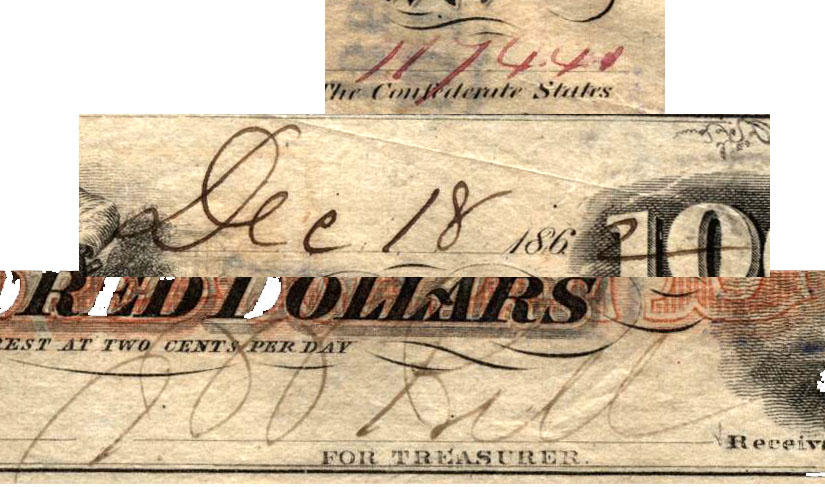 Y
Y
The first stroke here is tighter than those on the 15th and just slightly similar to the tight 'T' in the S example. The 'W' is wide and rounded like the other example. Bell is one stroke (three for signature).
Finally, I've added an example of Dec 22nd 1862 and another addition to the unlisted serial number runs of Walston/Bell.
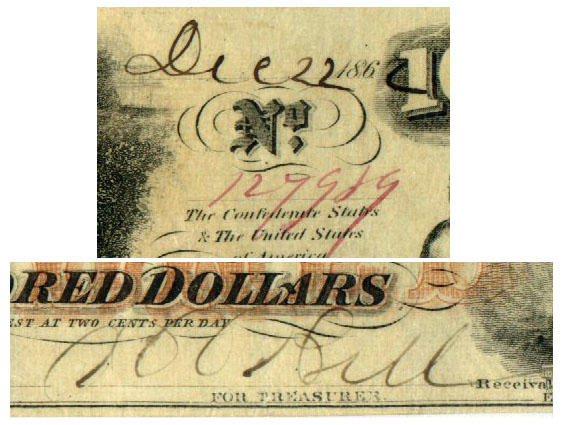 Z
Z
The "T" & "W" are the same as last, but he makes a much more recognizable "B" in this example. It takes Bell three (3) strokes to write his name once again.
These comparrisons, while not proof of anything, show, in my opinion, that TW Bell's signature was constantly changing. While many of the signatures are quite similar, there isn't a single one that is an exact duplicate of another; but, each, from day to day, exhibits some similarities to the last and the next.
What notes was WT Bell signing from Sept 25th 1862 to Dec 11th 1862? I'd like to see some of those to compare to these last few.
It's my opinion that all these notes are GENUINE. I also believe all of these Bell signatures are genuine as well. I don't think they are secretarial nor do I think they are forged. What do you think?
Col Crutch Williams CSA, TM01
Many believe that if signature combinations, date and/or serial number don't map to Thian, the note must be counterfeit. This is simply not the case. It is a good place to start when checking a note; but, it's not always correct as there are a number of errors in the Register. Most of the errors for TRAINS (T39/40) have been found and recorded; but, research on HOERS (T41) hasn't been as widly shared and this type is just now being discussed in greater depth.
Bell's signatures on these December issues are extremely large when compared to his earlier ones. Some recent collectors thought the notes counterfeit because the signatures are so different and with the serial numbers not matching either, that seemed to be a reasonable assumption. That opinion was based on a small sample of notes. However, after quite a few TRAINMEN studied notes in their collections and dealer's stock, it is now a majority opinion that the notes are genuine. And from that opinion comes the one that an error occured in the Confederate States Treasury Department ledger when signers and serial numbers were posted for these series.
While most believe the signatures are actually those of TW Bell, there are some contrary theories. A few suggest the signatures could be secretarial (someone else signed when he was absent) and there are others that believe these notes were stolen from the printer and the signatures forged.
Many TRAINMEN are still studying the notes bearing Bell's signature and at this time, we only agree on one point. We believe the notes themselves to be genuine There is no doubt in our minds that they were printed by Keatinge and Ball in Columbia, S.C. Are the signatures forged, or could they be secretarial, or did Bell change, significatly, the way he wrote his own name over the course of several months? Look at the signatures and points I make about each and see what conclusion you come to? Later, I will insert the opinions of various other TRAINMEN.
Crutch Williams TM-1
The Large Size WT Bell signature is found only on HOERS (T41). The Dates are correct for these six Serial Numbers. No Six (6) Digit serial numbers are recorded for Walston/Bell. All serial numbers listed below are attributed to Watkins/Bass. No specimens signed by Watkins/Bass are known for these 100 number runs that I show examples of. They are as follows:
Known Notes signed Walston/Bell Serial #s this date Serial #'s Known Bell
December 11, 1862 Serial # 103178 < 99801-103200 (103101-103200)
December 15, 1862 Serial # 103202 < 103201-103800 (103201-103300)
December 15, 1862 Serial # 103290 < do do
December 15, 1862 Serial # 108115 < 105401-116800 (108101-108200)
December 15, 1862 Serial # 108698 < do (108601-108700)
December 15, 1862 Serial # 109039 < do (109001-109100)
December 15, 1862 Serial # 113929 < do (113901-114000)
December 15, 1862 Serial # 114021 < do (114001-114100)
December 18, 1862 Serial # 117441 < 116801-117700 (117401-117500)
December 18, 1862 Serial # 121512 < do (121501-121600)
December 22, 1862 Serial # 127919 < 127701-134600 (127901-128000)
December 22, 1862 Serial # 127989 < do do
#note: There are actually several in some runs known
Listed Serial Numbers are notes belonging to Trainmen
Eight hundred (800) sheets of TRAINS a day is equivalent to 6,400 notes signed. Eighteen hundred (1800) sheets of HOERS a day is equivalent to 7,200 notes signed. An increase of only 800 notes per day for a pair of competent signers (200 sheets) is within reason. While some signed 800 sheets, others were signing 900. I also think it would be easier to stack, sign, turn and re-stack 4 subject sheets than the larger and more cumbersome 8 subject sheets. And finally, Memminger had instructed the note signers to stay on the job until the daily quota was met, so this increase would not have added a great deal of time to their day.
The totals listed for Watkins & Bass represent IMPOSSIBLE NUMBERS of runs (sheets) for one pair to sign per day. It is my opinion that there was an accounting error and the clerk making ledger entries for this time period became confused by the same initials of Walston/Bell and Watkins/Bass.
Here are the breakdowns of each pair according to the Register:
Walston/Bell** Serial #'s Registered Total ranges for entire day all signers
August 26th - #1 - 800 = 800 sheets (1-1800)
August 30th - #1801 - 2200 = 400 sheets (1801-2200 / 3801-7200)
September 6th - #10001 - 10800 = 800 sheets (8401-11600)
September 8th & 12th - #11601 - 12700 = 1100 sheets (11601-11900 8th = 300 / 11901-12700 12th = 800)
September 25th - #19001 - 19800 = 800 sheets (16401-19800 / 51601-51700)
September 29th - #22301 - 23100 = 800 sheets (14501-14700, 21501-21800, 21901-2300, 23101-23700, 23801-2400 )
* No further listings for Walston/Bell. What did they do for the two and half months of Oct to Dec 11th?
** Eight (8) Subject Sheets
Watkins/Bass** (Red marked items contain Walston/Bell signatures)
Serial #'s Registered
#103001 - 103800 > December 11th #103001-103200 < 200 sheets
do do > December 15th #103201-103800 < 600 sheets
#107801 - 109500 > December 15th < 1700 sheets (900 + 800 sheets)
#113501 - 114400 > December 15th < 900 sheets
#116801 - 117700 > December 18th < 900 sheets
#121101 - 122000 > December 18th < 900 sheets
#126001 - 126900 > December 18th #126001-126600 < 600 sheets
do do > December 22nd #126601-126900 < 300 sheets
#127701 - 128500 > December 22nd < 800 sheets
#130901 - 131800 > December 22nd < 900 sheets
#134201 - 135000 > December 22nd #134201-134600 < 400 sheets
do do > December 26th #134601-135000 < 400 sheets
** Four (4) Subject Sheets
The number of sheets attributed to Watkins/Bass for December 15th is 3200. The number of sheets for December 18th is 2400. The "norm" for each run of HOERS is 800 sheets with 900 sheets showing up in many cases. Two runs of 800 or 900 and of course smaller runs of 200, 300, 400 &c and combinations are found throughout the Register. With Watkins/Bass showing runs of 3200 and 2400 for December 15th and 22nd respectively, there has to be an ERROR in registering who signed these notes.
We know from the images that follow that Walston/Bell signed #103178 dated Dec 11th, 1862. More than likely, they signed the 200 sheet run of #103001-103200 attributed to Watkins/Bass. I have images of #103202 and 103290 that would suggest they signed the December 15th run of #'s 103201-103800. I also show images of #108698 and 109039 signed by Walston/Bell. These numbers are in the high range of the #107801 - 109500 dated December 15th, a total of 1700 sheets, attributed to Watkins/Bass. Since Watkins/Bass have signed several 900 sheet runs, it stands to reason that #107801-108700 were signed by Watkins/Bass and #108701-109500 were signed by Walston/Bell. Finally, I show an image of #117441 dated Dec 18th, 1862. This suggests that Walston/Bell signed the run of #'s 116801-117700, a total of 900 sheets.
Assigning the above serial number ranges to the two pairs (further examples need to be seen for proof) you get numbers (serial number ranges) that appear a bit more realistic when compared to other known combinations; but, the totals for Watkins/Bass still seem to be too large. If we continue to look at serial numbers and dates for Dec 18th and 22nd, I believe we will find more ranges for Walston/Bell and maybe even some other pair of signers.
Estimates of How Many these two pairs may have signed based on notes seen with their signature:
Walston/Bell Watkins/Bass
Dec 11 = 200 Dec 11 = 0
Dec 15 = 1400 Dec 15 = 1800
Dec 18 = 1800(-) Dec 18 = 600(+)
Dec 22 = 800 Dec 22 = 1600 < This number might to be wrong!
Dec 26 = 0 Dec 26 = 400
Total: 4200 Total: 4400 < These numbers possible
Less(-) 200 Less(-) 400
Total: 4000** Total: 4000**
**MEMO:
If you Delete the 200 sheets I've attributed to Walston/Bell on the 11th and the 400 attributed to Watkins/Bass on the 26th., you end up with exactly the same number, 4000 sheets, signed by the two pair of men.
Check for Dec 22, 1862 notes signed by Walston/Bell!
Randall Smith provided a Dec 22nd example with Walston/Bell signature combination thus adding another range of serial number previously unlisted. This newest addition is #127989.
IMAGES of BELL
These
images show the varied changes in BELL's signature over a four month time
span.
I have images of FOUR (4) August 16, 1862 TW Bell signatures.
 A
A B
B C
C D
DAll the signatures are slightly different, yet there are many similar aspects found on each. I probably should have recorded the serial numbers since A&D look nearly the same and B&C are very similar. In (A) the T, which looks like a "J" has been redrawn. There is a small "x" to start the W which is formed the way I've seen a lot of "H's" made. After the 'Start Point' the 'W' is one contineous stroke. The "B" is made with three separate strokes while the 'ell' is one contineous effort. The (B) signature has a clean "T" made with two strokes. Once again you see a tiny "x" starting point for the 'W' which is one stroke and looks like a 'W'. The "B" is two strokes and well formed with strong 'ell'. In (C) the 'T' is two strokes but is larger and more rounded. There is a heavy ink spot where he set his pen down to start the 'W' which is an even better 'W' than seen in (B). This 'Bell' is almost identical to the previous with the "e" being better formed. The 4th signature probably came after the 1st. The base of the T is much like the 1st with the small loop at top more ike the one on C (3rd). The W is formed almost identical to the one in A example. The 'B' in Bell is the size of A but formed in the same manner as B & C.
One each examples of August 20th, 23rd & 24th Aug 1862
 E
E F
F G
GExample E has a T quite similar to his first one; but, hit actually has three strokes. The W sorta looks like B&C above, but looks drawn and shakey. The B in this case starts with an upstroke and the second part looks like top of 8 and 2 (old style Q) at bottom and that part is one continous stroke. Example F has a T whose first stroke is similar to the first stroke of 'B' in example E. The small stroke at top is tied to the W which is a swirling W of one continous stroke (simlar to the December examples in my opinion). The 'B' starts at top attaching to the last stroke of the W, a loop with old style Q (2) at bottom and is conteneous. Example G on the 24th has a T tight like example B above, a looping W that looks more like an M and a wobbly loop top of B to 2 (Q) and continous to end for Bell.
Here's his first HOER dated Aug 26th, 1862
 H
HThe 'T' is formed much like exampe G above and the 'B' continues to change slightly but very much like above. Note that this signature is smaller; but, there is probably a reason for this. The SPACE he had to put his name is also smaller.
This August 30th, 1862 HOER is simlar with slight differences from last.
 I
IHere, for the 1st time, we have the letters 'TM' as one continous stroke with the pen stopping and what looks like a period. The 'B' starts very similar to H (and others) with one continous motion to finish.
There are two examples of Sept 1, 1862.
 J
J K
KIn example J, the T is one stroke with a small x or cross stroke and then the 'J' which is like some of his early 'T' bottoms. The 'T' in K is somewhere between G & H eamples. The W in J looks more like a 'W' in the beginning but the extra downstoke that is the backbone of the B makes it look like an M. I would call the K example an 'M' if I didn't know it was a 'W'. The top of the 'B' in the J example is smaller than all the other 'B' tops except that of the D example; but, even then it's different. All in all, the K example flows, as a signature better than any previous in my opinon.
I have one Sept 6th example on HOER.
 L
LThis L example is a new type of T for Mr. Bell. The W is also more looping with the 'B' in Bell more of a loop/Q (2) but similar to last and others. Notice he adds a downstroke to the last 'L' instead of taking it to the right or upward as all the last have been. (I didn't make note of this previously that he either goes up or straight out with the final stroke.
There are two examples of Sept 8th, 1862
 M
M N
NThe 'T' in these Sept 8th examples are slightly different. The 'M' are nearly the same while there is large loop in the top of 'B' in M but it's tight in N.
There are two Sept 11th, 1862 signatures.
 O
O P
PThe O example signature is made with only two (2) strokes. The 'T & W' are one and the 'Bell' is another with the first example of a squiggle 'T'. The 'Bell' is quite similar to last. In the P example, there are three strokes with the top of the 'T' being formed by the first stroke of the 'W'. Here it looks more like an M to me again. The 'B' has a defined loop at bottom as seen in F with loops in each letter of 'ell'. There is only one other signature with formed loops in the last three letters and that is the M example and they are quite weak in that one. His last stroke on this one is straight down.
Sept 15th 1862
 Q
QThe 'T' in this one is nearly the same as K example and similar to others. The 'W' has flowing loops similar to the I exmaple. The 'B' is larger and flowing and most similar to the B, C & D examples except it's in one stroke. Notice that the 'ell' are tight, no loops, and the last stoke is down and the the first one that goes to the left. He must have set his pen down as that is an ink spot that looks like dotted 'i'. This one looks like JM Bill to me! <G>
Sept 18th, 1862
 R
RThe 'T' is once again similar to several previous signatures. The 'W' looks like an 'M' and is similar to quite a few others. The 'B' is a bit wobbly and bigger with loops in all three letters 'ell' and here the last sroke goes to left like Q.
Sept 25th, 1862
 S
SThis 'T' is like no other example. The 'W' is similar to several but has a tiny upstroke at end. The 'B' is similar to others and the 'ell' have loops; but, the tops of the two L's are very pointed where most of the other ones are rounded. The last stroke is down and to right once again.
December 11th we see the first Large Size signature with serial number that doesn't map to Thian.
 T
TA three part signature. While there is no exact match for this example, in my opinion there are many similarities to all the letters we've seen previously . The first swirl of the W creating the cross and the 'W' is a well ballanced double loop in the same style as the first. Both letters are most similar to image L. The 'B' here is large and there is a strange squiggle at the bottom that has similar characteristics to the 'T' in the I example. An unformed "e" with normal 'll' we see the last stroke to right which was last seen on A - K examples.
Here are four (4) examples of the December 15, 1862 signatures.
 U
UThree strokes make this signature with end of 'W' extra ink or period.
 V
VFour strokes to make this signature with last of 'W' extra ink or period.
 W
WThree strokes here. There is an end stroke to the W or heavy downward period.
 X
XThere is an upsroke at end of 'W' as seen in I, K, L & S. There appears to be 4 strokes used here.
All four of the Dec 15th signatures are basicly the same taking either 3 or 4 strokes to write the name.
This next to last example is dated Dec 18th, 1862.
 Y
YThe first stroke here is tighter than those on the 15th and just slightly similar to the tight 'T' in the S example. The 'W' is wide and rounded like the other example. Bell is one stroke (three for signature).
Finally, I've added an example of Dec 22nd 1862 and another addition to the unlisted serial number runs of Walston/Bell.
 Z
ZThe "T" & "W" are the same as last, but he makes a much more recognizable "B" in this example. It takes Bell three (3) strokes to write his name once again.
These comparrisons, while not proof of anything, show, in my opinion, that TW Bell's signature was constantly changing. While many of the signatures are quite similar, there isn't a single one that is an exact duplicate of another; but, each, from day to day, exhibits some similarities to the last and the next.
What notes was WT Bell signing from Sept 25th 1862 to Dec 11th 1862? I'd like to see some of those to compare to these last few.
It's my opinion that all these notes are GENUINE. I also believe all of these Bell signatures are genuine as well. I don't think they are secretarial nor do I think they are forged. What do you think?
Col Crutch Williams CSA, TM01